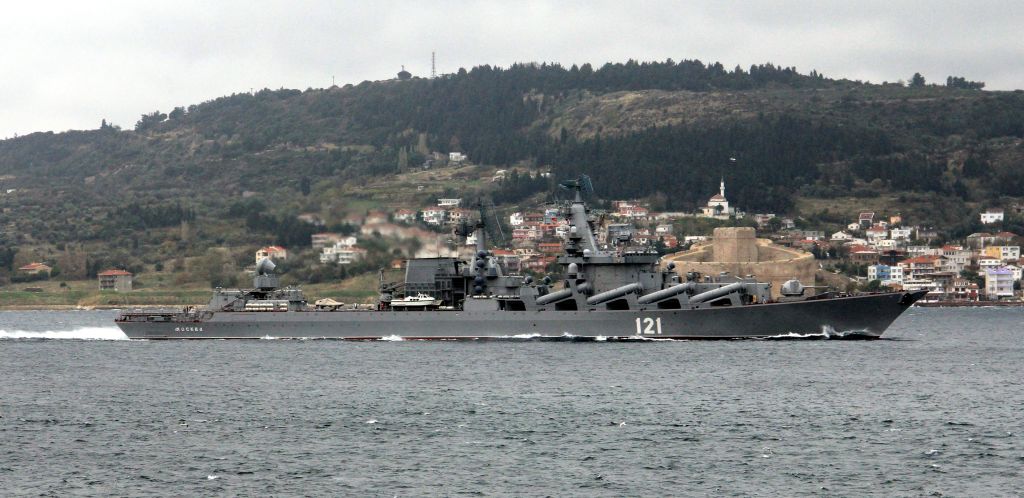Russia's loss of its Black Sea flagship Moskva is a 'massive blow,' and maybe also 'poetic justice'


A free daily email with the biggest news stories of the day – and the best features from TheWeek.com
You are now subscribed
Your newsletter sign-up was successful
Russian and Ukraine agree that the Russian missile cruiser Moskva, its Black Sea flagship, was taken out of commission on Wednesday, but there's no agreement on how that happened. Russian state-run media, citing the Defense Ministry, said "ammunition detonated as a result of a fire on the Moskva missile cruiser," the ship "was seriously damaged," and "the entire crew" of 510 was evacuated. Hours earlier, the governor of Odessa said Ukraine had hit the ship with Neptune anti-ship missiles and inflicted "very serious damage."
Either way, "one of the Russian Navy's most important warships is either floating abandoned or at the bottom of the Black Sea, a massive blow to a military struggling against Ukrainian resistance 50 days into Vladimir Putin's invasion of his neighbor," CNN reports. And "whatever the reason for the fire, the analysts say it strikes hard at the heart of the Russian navy as well as national pride, comparable to the U.S. Navy losing a battleship during World War II or an aircraft carrier today."
Alessio Patalano, professor of war and strategy at King's College in London, said losing the Moskva would be a "massive blow" for Russia.
The Week
Escape your echo chamber. Get the facts behind the news, plus analysis from multiple perspectives.

Sign up for The Week's Free Newsletters
From our morning news briefing to a weekly Good News Newsletter, get the best of The Week delivered directly to your inbox.
From our morning news briefing to a weekly Good News Newsletter, get the best of The Week delivered directly to your inbox.
"Only the loss of a ballistic missile submarine or the Kutznetsov," Russia's lone aircraft carrier, "would inflict a more serious blow to Russian morale and the navy's reputation with the Russian public," retired U.S. Navy Capt. Carl Schuster, former director of operations at the U.S. Pacific Command's Joint Intelligence Center, tells CNN.
It is "a significant setback for Russia's war effort, for both military and morale reasons," and the Moskva's demise would "be seen as poetic justice in Ukraine," since it was the warship that told Ukrainian forces to surrender on Snake Island early in the war, only be told to "go f--k yourself," BBC News reports. "In more practical terms, this incident is likely to result in Russian warships having to move further offshore for their own safety," and the Moskva has been a thorn in Ukraine's side since the invasion began, "loitering offshore and menacing" Odessa.
A free daily email with the biggest news stories of the day – and the best features from TheWeek.com
Peter has worked as a news and culture writer and editor at The Week since the site's launch in 2008. He covers politics, world affairs, religion and cultural currents. His journalism career began as a copy editor at a financial newswire and has included editorial positions at The New York Times Magazine, Facts on File, and Oregon State University.
-
 Crisis in Cuba: a ‘golden opportunity’ for Washington?
Crisis in Cuba: a ‘golden opportunity’ for Washington?Talking Point The Trump administration is applying the pressure, and with Latin America swinging to the right, Havana is becoming more ‘politically isolated’
-
 5 thoroughly redacted cartoons about Pam Bondi protecting predators
5 thoroughly redacted cartoons about Pam Bondi protecting predatorsCartoons Artists take on the real victim, types of protection, and more
-
 Palestine Action and the trouble with defining terrorism
Palestine Action and the trouble with defining terrorismIn the Spotlight The issues with proscribing the group ‘became apparent as soon as the police began putting it into practice’
-
 Taiwan eyes Iron Dome-like defence against China
Taiwan eyes Iron Dome-like defence against ChinaUnder the Radar President announces historic increase in defence spending as Chinese aggression towards autonomous island escalates
-
 The mission to demine Ukraine
The mission to demine UkraineThe Explainer An estimated quarter of the nation – an area the size of England – is contaminated with landmines and unexploded shells from the war
-
 How will the MoD's new cyber command unit work?
How will the MoD's new cyber command unit work?Today's Big Question Defence secretary outlines plans to combat 'intensifying' threat of cyberattacks from hostile states such as Russia
-
 What are the different types of nuclear weapons?
What are the different types of nuclear weapons?The Explainer Speculation mounts that post-war taboo on nuclear weapons could soon be shattered by use of 'battlefield' missiles
-
 The secret lives of Russian saboteurs
The secret lives of Russian saboteursUnder The Radar Moscow is recruiting criminal agents to sow chaos and fear among its enemies
-
 Is the 'coalition of the willing' going to work?
Is the 'coalition of the willing' going to work?Today's Big Question PM's proposal for UK/French-led peacekeeping force in Ukraine provokes 'hostility' in Moscow and 'derision' in Washington
-
 Ukraine: where do Trump's loyalties really lie?
Ukraine: where do Trump's loyalties really lie?Today's Big Question 'Extraordinary pivot' by US president – driven by personal, ideological and strategic factors – has 'upended decades of hawkish foreign policy toward Russia'
-
 Is Gaza ceasefire deal about to fizzle out?
Is Gaza ceasefire deal about to fizzle out?Today's Big Question Israel and Hamas accuse each other of deliberately breaking first phase of the fragile truce, which is set to expire on Saturday
